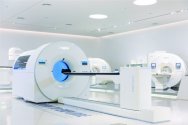Chinese heavy machinery are cheaper and finding their way around global south. In this case, it’s building Ghana.
You are using an out of date browser. It may not display this or other websites correctly.
You should upgrade or use an alternative browser.
You should upgrade or use an alternative browser.
News on China's scientific and technological development.
- Thread starter Quickie
- Start date
Take this news very serious.. this is first time a Chinese made High end CT scan machine installed in Europe..
Shanghai based ''United Imaging'' developed world's 1st Total-body PET/CT system With 40 times greater sensitivity than conventional devices, the machine can achieve full body imaging in 15s.. this machine installed in newly established Nuclear Medicine Department at a hospital in Rome, Italy.

United imaging Shanghai send their team to Rome, Italy for help them to install entire system and train their staff as well..

High end Medical equipment is another bread and Butter field of western powers for so long. but in recent years China not only break their monopoly but also started to export in overseas markets..
CT/MR scanning machines are very technological complex and require high precision to manufacture..
Pardon, but what? Are you actually a software engineer?In software, an engineer that works 12hrs per day generally is not going to be only 50% more productive than an engineer working 8hrs per day - generally it is more like a 100% increase. This is due to the nature of the work.
Have absolutely never heard or seen this shit. Flexible hours are a productivity increase, yes, but 12 hrs is 100% more than 8 hrs? Knowledge workers don't operate like some sort of ramping up factory worker lol. There's only a few hours of true focused work that can happen before people mentally clock out.
Maybe if 50% of your 8 hours at work is consumed by meetings that would be possible. But then that's not 12 hrs > 8 hrs, that's: why the hell do you have so many pointless meetings.
Yeah seriously. Some of the takes on WLB I've read here have made me seriously question if the people making these takes have ever worked a knowledge job in their life. There is no way 996 in China or any country leads to huge productivity gains. That's just not how people's brains work. The only time more hours lead to more output on a linear slope is when the work itself is linear like manufacturing.Pardon, but what? Are you actually a software engineer?
Have absolutely never heard or seen this shit. Flexible hours are a productivity increase, yes, but 12 hrs is 100% more than 8 hrs? Knowledge workers don't operate like some sort of ramping up factory worker lol. There's only a few hours of true focused work that can happen before people mentally clock out.
Maybe if 50% of your 8 hours at work is consumed by meetings that would be possible. But then that's not 12 hrs > 8 hrs, that's: why the hell do you have so many pointless meetings.
Meetings are exhausting too...Pardon, but what? Are you actually a software engineer?
Have absolutely never heard or seen this shit. Flexible hours are a productivity increase, yes, but 12 hrs is 100% more than 8 hrs? Knowledge workers don't operate like some sort of ramping up factory worker lol. There's only a few hours of true focused work that can happen before people mentally clock out.
Maybe if 50% of your 8 hours at work is consumed by meetings that would be possible. But then that's not 12 hrs > 8 hrs, that's: why the hell do you have so many pointless meetings.
FriedRiceNSpice
Major
As I mentioned before, the vast majority of software engineers are not able to be able to focus for 12 hours a day and will encounter burn-out/drops in productivity. 4 hours of meetings every day would definitely be excessive, but 2-3 hour of meetings a day would not be unexpected at all. On top of that, there is a significant chunk of the day that goes towards under non-code activities, ie code reviews, overseeing deployments, checking emails, interviewing candidates, syncing up with team members, etc. When it comes to actually coding or designing, there is definitely some ramp up time associated. Generally, you aren't able to just pick up from where you left off and immediately start coding at your optimal pace. It takes a bit of time to fully get into the zone. That's why frequent context switches (commonplace with meetings spread out throughout the day) kills productivity for a software engineer.Pardon, but what? Are you actually a software engineer?
Have absolutely never heard or seen this shit. Flexible hours are a productivity increase, yes, but 12 hrs is 100% more than 8 hrs? Knowledge workers don't operate like some sort of ramping up factory worker lol. There's only a few hours of true focused work that can happen before people mentally clock out.
Maybe if 50% of your 8 hours at work is consumed by meetings that would be possible. But then that's not 12 hrs > 8 hrs, that's: why the hell do you have so many pointless meetings.
Why would 996 be so pervasive in China if it didn't lead to more productivity gains? Why else does China moves so fast when it comes to engineering/technology?Yeah seriously. Some of the takes on WLB I've read here have made me seriously question if the people making these takes have ever worked a knowledge job in their life. There is no way 996 in China or any country leads to huge productivity gains. That's just not how people's brains work. The only time more hours lead to more output on a linear slope is when the work itself is linear like manufacturing.
Yea, if you have 2-3 hours of meetings a day every day, you have too many meetings.As I mentioned before, the vast majority of software engineers are not able to be able to focus for 12 hours a day and will encounter burn-out/drops in productivity. 4 hours of meetings every day would definitely be excessive, but 2-3 hour of meetings a day would not be unexpected at all. On top of that, there is a significant chunk of the day that goes towards under non-code activities, ie code reviews, overseeing deployments, checking emails, interviewing candidates, syncing up with team members, etc. When it comes to actually coding or designing, there is definitely some ramp up time associated. Generally, you aren't able to just pick up from where you left off and immediately start coding at your optimal pace. It takes a bit of time to fully get into the zone. That's why frequent context switches (commonplace with meetings spread out throughout the day) kills productivity for a software engineer.
996 isn't a small company thing, it's a big company thing. In those big companies, you should have sufficient separation of tasks that you should have 1 hours of meetings a day at most. Remember also that 996 is imposed not just on senior positions but also juniors and juniors definitively don't need to be in 2-3 hours of meetings every day.
As CMP mentioned, meetings are exhausting too. Making up for 2-3 hours of poorly placed meeting times by working 12 hours is like breaking your leg for no reason and getting a crutch to "improve" your mobility. You shouldn't be breaking your leg in the first place and you're worse off than the person that had a properly optimized schedule in the first place.
If you actually get in the zone, studies show you'll only have mental capacity to last 4-5 hours a day at most. Not even just that, studies on factory workers also show productivity levels off around 7 hours/day, and falls off a cliff at over 10 hours/day. A factory worker at 70 hours/week is functionally equivalent to a worker who did 55 hours/week. It's not just that productivity levels off, but people also make significantly more errors for both types of work. Factory worker injury rate doubles when working longer (~40% vs ~20%). Software developers will introduce more and more bugs into the code and architecture they think up as the hours stretch longer.
There's a functional limit to useful work that can be done in an average day. Western factory workers, for example, aren't hitting it because they show up drunk or high. but over-correcting to the other extreme and working 12 hours days every day isn't useful either.
996 is so pervasive because of competition. When you have 1000 equally qualified people competing for your spot in work, it becomes tempting to conduct all sorts of showy activities intended to signal to your bosses your determination. If someone is doing 996, you might be tempted to also do 996 just to not "fall behind" in your bosses' eyes.Why would 996 be so pervasive in China if it didn't lead to more productivity gains? Why else does China moves so fast when it comes to engineering/technology?
They're not actually productive uses of time. It is like why parents will hire professional baby handlers and play Mozart to the baby in the womb. It's not useful, but they see others doing it and fear they'll miss out if they don't do it also.
China moves so fast in engineering/technology because China has a massive STEM talent pool there. China has 4x the number of STEM graduates per year of the USA. Given the increasing quality of Chinese universities, these aren't diploma mills either nor is China lacking capital these days. Now with the synergistic effect of more skilled workers in a single place, I would expect China to move at least 4x faster than the USA in engineering/technology.
996 is hampering China, but it's fundamentals are strong enough to compensate. It doesn't mean 996 is a net positive.
Last edited:
“
Chinese pharmaceutical industry insiders have warned that foreign takeovers may damage the sector and even threaten national security.
Since December, five Chinese biotech drug makers have been sold to global pharmaceutical giants.
Industry insiders have warned that this could have a negative impact, especially given the risk that the United States could extend its technology sanctions to essential medicines.
“
